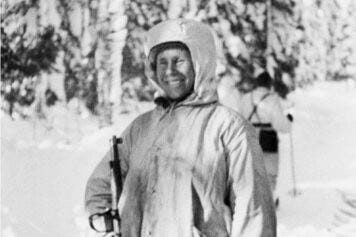I still remember the day my friends and I first met Major König — or at least, the version of him brought to life by Ed Harris in Enemy at the Gates (2001). We were a bunch of teenagers, blood rushing from too many hours spent in the world of wargames. We worshipped precision, discipline and in some ways the chaotic beauty of history’s biggest conflict. Saving Private Ryan (and Starship Troopers, yes) had set our brains on fire a few years earlier, and anything that promised even a fraction of that raw, boots-on-the-ground storytelling had our attention.
Enemy at the Gates meet our expectations . There was no sweeping charge or endless firefight here. Just silence and fear. The whisper of death you never heard coming. And standing at the cold center of it all was Major König:
The man who became the sniper archetype for me.
Calm to the point of being chilling, ruthless but almost elegant in his cruelty. I won’t lie — König was the coolest figure in the film for me.
Even with his brutality (you know what i am talking about), there was a professionalism that fascinated us, because he was perfect at what he did.
And in those two hours, I realized the sniper isn’t just a soldier is an entire way of seeing the world.
The Sniper's Long Lineage
The sniper didn’t begin with rifles and scopes. His spirit has haunted human imagination for thousands of years.
In the mythology of ancient Greece, Apollo stands as the first great marksman. His arrows never miss. They brought plagues or blessings from across impossible distances. Every strike was a message. The Norse pantheon gives us Ullr, a lesser-known but fierce figure: the god of hunting and winter, skating over snow and bringing down prey with peerless accuracy. Ullr lived alone, moving ghostlike across endless white, patient and deadly. A mythic mirror of the sniper’s lonely road.
In history, real-life specters emerged. Simo Häyhä, the “White Death” of Finland, racked up over 500 kills during the Winter War, often without a scope. His face wrapped in frost, his movements slow and deliberate, he became a nightmare stitched into the snowy forests. And there was Francis Pegahmagabow, a First Nations Canadian soldier whose combination of indigenous tracking skills and sharpshooting mastery made him a ghost on the Western Front in WWI.
Steady Hands, Steadier Mind
What defines the sniper? It's not just the weapon:
● Patience Beyond Normal Limits: Snipers treat time as a tool, not an enemy. They wait, stretching every second until it snaps for their target.
● Surgical Precision: One shot isn’t just a choice — it’s a commitment. There are no second chances, no corrections.
● Detachment from Emotion: The job demands coldness. Hesitation means death. Feeling too much, even pride, can cloud the sight picture.
● Mastery of the Environment: They don’t fight the battlefield; they become part of it, unseen and unremarkable until it’s too late.
● Single-Minded Focus: A sniper blocks out hunger, fear, exhaustion — only the target matters. Everything else is background noise.
Different Shades of Silence
Snipers aren’t all cut from the same cloth. Across cinema, they come in many forms:
● The Ghost Sniper
A near-mythical figure, striking from nowhere. Ghost Dog (Ghost Dog: The Way of the Samurai) moves through urban jungles the way Ullr moved through snowy woods — invisible and inevitable.
● The Vengeful Marksman
Not duty, not honor — personal loss sharpens the aim. Mathilda (Léon: The Professional) turns assassination into a way of reclaiming her stolen childhood.
● The Reluctant Killer
Burdened by conscience, forced by necessity. Vasily Zaitsev (Enemy at the Gates) becomes a sniper because survival demands it.
● The Cold Professional
Emotionless, clinical, devastatingly efficient. Chris Kyle (American Sniper) shows the high cost of shutting out feeling to survive in war.
● The Lone Survivalist
Trapped, hunted, but too smart and too skilled to fall. Bob Lee Swagger (Shooter) survives because precision is his only language, and paranoia his only shield.
The Silent Architects
In Enemy at the Gates, Major König is more than an antagonist. He makes every decision heavier and every breath shorter. He is the danger. Without König stalking the ruins of Stalingrad, there would be no transformation for Vasily. His cold precision forces Vasily Zaitsev to evolve from a lucky shooter into a true sniper — patient, calculating and professional. König defines the arena where survival is about nerve, wit, and the willingness to become a ghost yourself. König forces the story’s hero — and the audience — to confront the cost of becoming the thing you fear.
This is the sniper’s true narrative power. They kill innocence, certainty and they force the characters — and us — to change.
Have you ever faced a moment where patience, precision, and total focus were your only weapons?
Think back — how did it change you?
When everything depends on a single, silent moment — can you pull the trigger?








